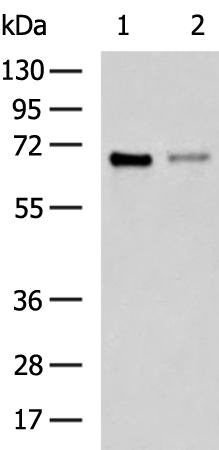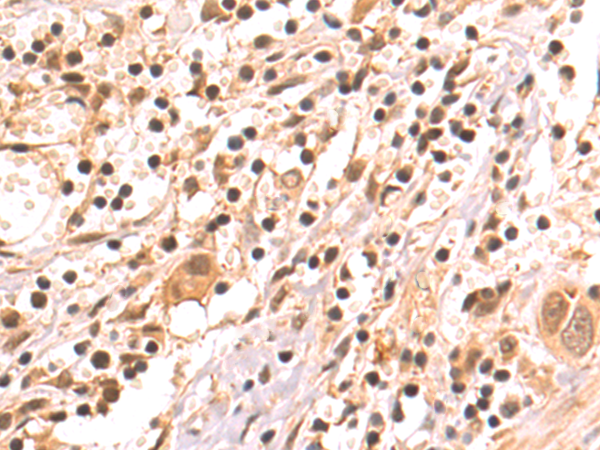

| WB | 咨询技术 | Human,Mouse,Rat |
| IF | 咨询技术 | Human,Mouse,Rat |
| IHC | 1/50-1/100 | Human,Mouse,Rat |
| ICC | 技术咨询 | Human,Mouse,Rat |
| FCM | 咨询技术 | Human,Mouse,Rat |
| Elisa | 1/5000-1/10000 | Human,Mouse,Rat |
| Aliases | ER; ESR; Era; ESRA; ESTRR; NR3A1 |
| WB Predicted band size | 66 kDa |
| Host/Isotype | Rabbit IgG |
| Antibody Type | Primary antibody |
| Storage | Store at 4°C short term. Aliquot and store at -20°C long term. Avoid freeze/thaw cycles. |
| Species Reactivity | Human, Mouse |
| Immunogen | Synthetic peptide of human ESR1 |
| Formulation | Purified antibody in PBS with 0.05% sodium azide and 50% glycerol. |
+ +
以下是关于ESR1抗体的3篇代表性文献的简要信息,涵盖其在乳腺癌研究中的应用及机制探索:
---
1. **文献名称**:*Estrogen receptor (ER) antibodies in the evaluation of breast cancer*
**作者**:Hammond MEH, et al.
**摘要**:该研究评估了不同ESR1抗体在免疫组化(IHC)检测中的特异性和敏感性,提出标准化检测流程以提高乳腺癌患者ER状态判读的准确性,为临床治疗决策提供依据。
---
2. **文献名称**:*ESR1 mutations and therapeutic resistance in metastatic breast cancer*
**作者**:Toyama T, et al.
**摘要**:通过磷酸化特异性ESR1抗体分析,揭示ERα的激活态(如pS118-ESR1)与内分泌治疗耐药性相关,为靶向ESR1信号通路的药物开发提供新思路。
---
3. **文献名称**:*Quantitative analysis of ESR1 expression in luminal breast cancer*
**作者**:Allred DC, et al.
**摘要**:利用ESR1抗体进行定量IHC评分,证实ERα表达水平与乳腺癌患者预后及内分泌治疗响应率显著相关,支持其作为关键生物标志物的临床价值。
---
以上文献均聚焦于ESR1抗体在乳腺癌分子分型、耐药机制及治疗评估中的应用,相关研究发表于*J Clin Oncol*、*Clin Cancer Res*等期刊。如需具体出版年份或PMID,可进一步补充。
Estrogen receptor alpha (ERα), encoded by the ESR1 gene, is a nuclear hormone receptor critical for mediating estrogen signaling in hormone-responsive tissues. It plays a key role in regulating gene expression by binding estrogen, dimerizing, and interacting with specific DNA response elements or other transcription factors. Dysregulation of ESR1/ERα is strongly implicated in hormone-dependent cancers, particularly breast cancer, where ~70% of cases are ER-positive. ESR1 antibodies are essential tools for detecting ERα expression in clinical and research settings.
In diagnostics, ESR1 antibodies (e.g., via immunohistochemistry) determine ER status in breast tumors, guiding endocrine therapy decisions (e.g., tamoxifen or aromatase inhibitors). Research applications include studying ERα’s role in cancer progression, drug resistance, and interactions with co-regulators. ESR1 mutations (e.g., ligand-binding domain mutations) are linked to endocrine therapy resistance, making these antibodies vital for characterizing metastatic or recurrent cancers.
Commercial ESR1 antibodies often target epitopes in the N-terminal transactivation domain (e.g., clone 1D5) or C-terminal ligand-binding domain. Validation for specificity (e.g., using ER-negative cell lines) is critical due to cross-reactivity risks. Beyond oncology, ESR1 antibodies aid studies in reproductive biology, bone metabolism, and cardiovascular health. Emerging techniques like single-cell sequencing and spatial profiling further expand their utility in precision medicine.
×